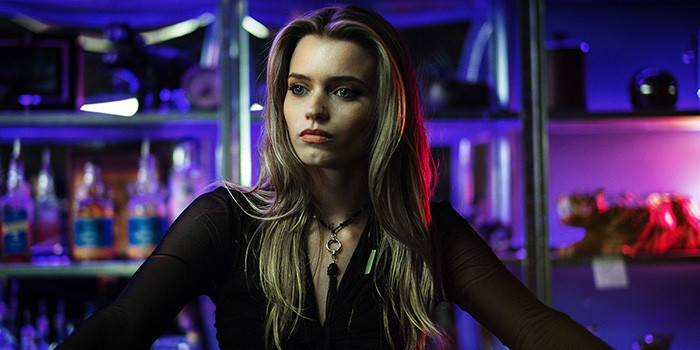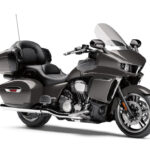Stephen McCallum’s film Outlaws immediately throws viewers into the gritty world of motorcycle clubs, but it’s hard to ignore the rumble of comparison with Sons of Anarchy echoing in the background. While aiming to judge Outlaws on its own merits, the script by Matt Nable sparks inevitable thoughts of Kurt Sutter’s famed series, especially with its central conflict: a Copperheads Motorcycle Club at a crossroads. Paddo, the would-be leader played by Ryan Corr, is pushing for legitimacy, a stark contrast to Knuck, portrayed by Nable himself, the club’s president returning from prison with a thirst for the old, violent ways. This core tension feels strikingly familiar, raising the question of whether Outlaws intentionally courts this comparison to a series so deeply embedded in popular culture’s image of biker gangs.
The challenge for Outlaws lies in its cinematic brevity. Where television series like Sons of Anarchy luxuriate in episode after episode to develop character depth and intricate relationships, Outlaws has a mere ninety minutes to carve its narrative. The supposed father-son dynamic between Knuck and Paddo, crucial to their conflict, feels underdeveloped, mentioned almost as an afterthought. This late reveal of their bond, just as their ideologies shatter, makes it difficult to believe in any prior affection or respect. The film suggests that three years apart has created an unbridgeable chasm, twisting Knuck into a paranoid leader threatened by his protégé’s ambition, and Paddo into a pragmatist wary of Knuck’s unchecked brutality in a changing world.
However, the film introduces female characters who purportedly accelerate this divide, but this is where Outlaws stumbles when placed against the benchmark of Sons of Anarchy. Hayley, Knuck’s wife (Simone Kessell), and Katrina, Paddo’s girlfriend (Abbey Lee), lack the nuanced complexity of Sons’ female leads. They aren’t maternal figures caught in moral dilemmas, nor are they outsiders yearning to pull their partners from the outlaw life. Instead, Hayley and Katrina are presented as manipulative figures, devoid of empathy, solely focused on seizing control. Hayley whispers distrust of Paddo into Knuck’s ear, while Katrina goads Paddo into a violent power grab.
These women are undeniably portrayed as intelligent strategists, seemingly orchestrating events from the shadows. The film hints at their long-term manipulation, yet it struggles to make this manipulation believable due to its reliance on tired, sexist biker gang stereotypes. Instead of fleshing out these characters, Outlaws resorts to caricature. Paddo’s simpleton brother, Skink (Josh McConville), is introduced as a plot device, conveniently igniting the clash between the old and new guard within the Copperheads. Skink becomes the puppet acting on the women’s suggestions, while the supposedly tougher, more experienced men waver and grapple with their consciences.
 Ryan Corr and Matt Nable in Outlaws
Ryan Corr and Matt Nable in Outlaws
The film fails to subvert macho biker culture tropes; it reinforces them. Paddo and Knuck seem to hesitate at the brink of outright war, not out of inherent moral conflict, but because acknowledging the women’s influence would bruise their egos, forcing them to confront the idea of sacrificing brotherhood at the behest of women. Skink, the expendable fool, becomes the catalyst for the violence Katrina and Hayley desire. This reliance on a character solely designed to create chaos equates sensitivity with naiveté, a theme further emphasized through Noisy (Sam Parsonson), in another questionable narrative choice.
Beyond the prevalent misogyny that reduces Katrina and Hayley to stereotypical sirens leveraging sexuality for power, Outlaws also veers into problematic homophobia. It’s revealed that Knuck engaged in same-sex relationships in prison, but instead of exploring this with any depth or nuance, it becomes another tool to reinforce a toxic, hyper-masculine environment. The film portrays Knuck’s same-sex desire as more depraved than his other violent tendencies, suggesting that homosexuality is a greater transgression against biker gang masculinity.
While one could argue this portrayal reflects certain harsh realities within outlaw motorcycle club culture, it doesn’t excuse the film’s uncritical presentation in a contemporary context. Simply depicting reprehensible characters doing reprehensible things isn’t enough. There’s still a sense of glorification in showcasing this lifestyle as inherently cinematic. The film attempts to depict the power struggles and betrayals as thrilling, but by simultaneously equating homosexuality with betrayal, Outlaws sends a damaging message, never clarifying or challenging this harmful conflation.
Is Outlaws technically well-made? In parts. A tense opening scene between Paddo and Sugar (Aaron Pedersen), the leader of a rival club, is gripping, though this plot thread is later somewhat dropped amidst the Copperheads’ internal strife. Lee and Kessell deliver capable performances despite their characters’ two-dimensionality. Corr and Nable are also effective as men wrestling with difficult choices, yet their characters often seem defined by their allegiance to the club “colors” above personal conviction. Ultimately, without deeper exploration of these internal conflicts and motivations, Outlaws may primarily appeal to viewers already immersed in or fascinated by the violent, outlaw biker gang lifestyle, rather than offering broader cinematic substance.
Outlaws had a limited release starting February 1st.
Grade: C-

